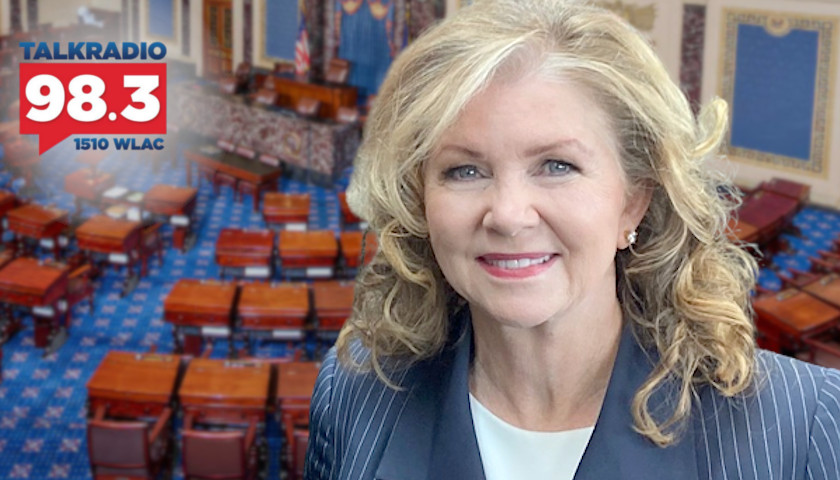Live from Music Row Thursday morning on The Tennessee Star Report with Michael Patrick Leahy – broadcast on Nashville’s Talk Radio 98.3 and 1510 WLAC weekdays from 5:00 a.m. to 8:00 a.m. – guest host Aaron Gulbransen welcomed Senator Marsha Blackburn to the newsmaker line to discuss her recent op-ed that addresses issues surrounding rules, regulations, privacy and reforms for Section 230.
Gulbransen: We have a very special guest on our newsmaker line joining us right now – U.S. Senator Marsha Blackburn. How are you, ma’am?
Blackburn: Good morning. How are you? And I’m delighted to join you!
Simon: Hi Marsha, it’s Roger. How are you?
Blackburn: I am doing well, Roger. Always so good to hear from you. And keep up the great job writing.
Simon: Thank you. But I gather you’re getting into my line of work here. I’m a little bit threatened. (Laughter)
Gulbransen: Senator Blackburn wrote an op-ed, which is a great op-ed about a proposal being made by Google. And of course, you’ve had your run-ins with big tech that are well documented.
And the proposal, as I understand it, that Google has made as a pilot program in the form of advisory opinion with the Federal Election Commission, would eliminate all spam-filter algorithms for participating candidates and organizations. Can you talk to us about that a little bit?
Blackburn: Yeah, exactly. And Aaron, I’ve got to walk it back a little bit, and where we got going on this. And Roger knows that I’ve put a lot of time into big tech – how we are going to get them to abide by rules and regulations, and respect privacy reforms for Section 230.
So all of that has been a part of the work that I’ve done. Well, in the course of that, we started to hear from political campaigns in churches and conservative organizations, pro-life organizations, and they would say, you know, people are telling us that our emails always go to spam, even if they signed up for our email list, so what’s the deal with this?
And they couldn’t get straight answers. Well, individuals would tell us if they sign up for an email listserv, that is there for a Democratic candidate or a left-leaning group, all of those emails go to their inbox.
So we began to question Google about this. And you can imagine what they immediately said: Oh, it’s not us. It is the algorithms. It is all the fault of artificial intelligence and algorithms.
Well, we reminded them that engineers are the ones who set the algorithms. AI is set by these algorithms. And if you’re going to bias, and seat that bias, into the algorithm, of course, it’s going to push you further Left.
Simon: Yes. We used to call that garbage in, garbage out in the beginning of the internet.
Gulbransen: There you go. Of course, as you’re correctly pointing out, who pays the engineers? Well, it’s big tech, right?
Simon: Not only who pays them – what do they really think?
Blackburn: Right. Then, they didn’t want to talk about the content moderators. And of course, these content moderators for the social media platforms and for Google, all of them sit on the West Coast. They are bringing their bias to work for them, or with them.
And we pointed out that these content moderators are subjective. Even if you have these algorithms that they say, oh, they’re objective, they’re not subjective, which, of course, is inaccurate.
And I think it dawned on Google that things are going to change. And the next chair of the Consumer Protection Data Security Committee is probably going to be a Republican who has worked on this issue for years because now she’s the top Republican on that committee.
So they said, okay, okay, what we’re going to do is go work with the Federal Election Commission, and we are going to put together a panel of advisors, and we’re going to issue advisory opinions as to how this should be approached.
And basically what I said was, oh, no. Because what you’re trying to do is slow-walk making changes, and get yourself through the election cycle in November, and then you can go back to doing whatever it is that you want to do.
And we’re just not going to stand for that. So we continue. I mean, this is such a phony fix, and they’re trying to get around saying they’re wrong, and they’re trying not to admit that what they’ve been doing …
Simon: Marsha, may I ask you a more macro question about this? Because I know you’ve been dealing with the big-tech issue for some time. The old antitrust legislation that was written, I don’t know how many years ago, the people who wrote it could have no idea of companies like this, like Alphabet and even Apple or Twitter.
They’re all multinational, way above the state. Maybe more powerful than the state. Are people considering how to rewrite that kind of legislation and really go after it?
Blackburn: Oh yes. Yes. As a matter of fact, one of the bills that is moving forward is a piece of legislation that I have with Senator Blumenthal, so it’s bipartisan.
It’s called the Open App Market Act, which would allow innovators of apps to immediately work with the people that are downloading the app and not have to go through the Apple or Google App Store, because they have a corner on that market, and you can’t put that app on their device unless you go through them.
And they call this side loading, and we’re just saying, no. Anybody that has an app – let’s say you use St. Thomas Hospital, and let’s say St. Thomas Hospital had an app.
And let’s say you wanted to put that on your device because that’s where you go for all of your healthcare needs. Or that there is a store that you regularly do business with, and you wanted to put their app on your phone so that you could go in and, let’s say it’s McDonald’s. You wanted to be able to order from McDonald’s or from Starbucks, but you didn’t want to have to go to the App Store to put that on there because every time you go into that App Store and you download an app, not only are you paying, but what are they doing? They’re collecting your data, and then they’re monitoring the number of times you use that app.
Listen to the interview:
– – –
Tune in weekdays from 5:00 – 8:00 a.m. to The Tennessee Star Report with Michael Patrick Leahy on Talk Radio 98.3 FM WLAC 1510. Listen online at iHeart Radio.
Photo “Marsha Blackburn” by Marsha Blackburn.






Not all politicians have an eye toward the enormous partisan influence of leftist tech giants such as Google, Facebook, and Twitter. Yet that issue is one of the most important in the world because of the level of influence over politics.
To me, Senator Blackburn is a treasure.
So Marsha Blackburn believes in privacy, does she? She can prove that by opposing the requirement that people SHOW their birth gender instead of stating their gender preference. Requiring boys and girls to show birth certificates as proof of their BIOLOGICAL gender, or in having to submit to strip searches to prove their biological gender is a major invasion of privacy right there, Madame Senator!